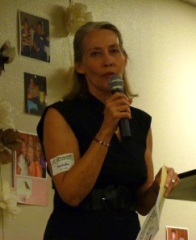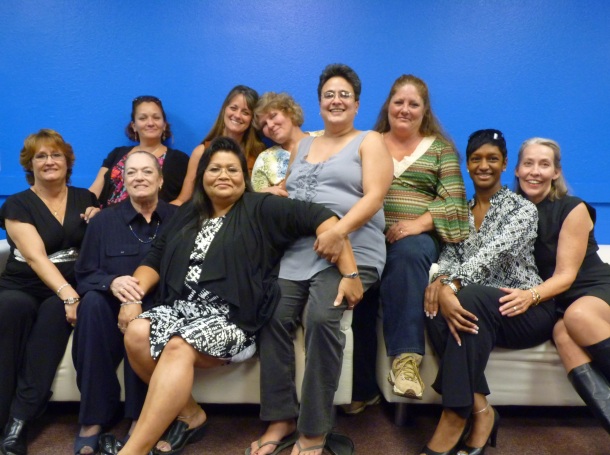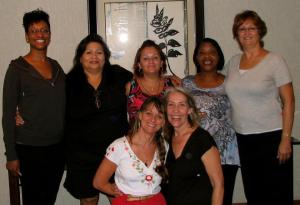We thought that readers and supporters might like to know the story behind Truth Be Told, and that of its founders. Today we share with you a Q&A with Nathalie Sorrell, TBT co-founder and Behind Bars director.
How did you come to start Truth be Told?

My spiritual life has been important to me since I was 12 years old. Being honest with myself and others, and walking my talk has been a goal all my adult life Seeking personal and spiritual growth tools and passing them on has been my joy and passion. I loved being with church ladies like myself and nurtured and ministered to women friends and church ladies for the years from 35-52. But every spiritual person has to face at some point what they are willing to do that is outside their comfort zone, for the simple reason that it is spiritually unsound and inconsistent to always stay within the boundaries of what we are used to.
I was afraid of being face to face with people in great need.
I had a middle class, financially secure upbringing, with stable, strong and consistent role models in my parents. I did not identify with nor feel emotionally safe with people who were down and out, in poverty, or beyond the bounds of polite society. When I finally made the decision to do something about the shame I felt for having a life easier than others and for avoiding doing anything other than giving money from a distance – I chose to start with visiting women in prison. It was not a noble reason. I felt less guilt since I couldn’t be expected to take them home with me, than I felt when I fed the homeless and went home to my good house with extra rooms. So I got the TDCJ training required of any TDCJ volunteer. There I met a British, Jewish woman from Lockhart who wanted to do something to help women with their self-esteem. I learned Lockhart prison was the closest prison to Austin with female population.
When my new friend learned I was a Christian, she said “You have to go through a chaplain to volunteer. You can speak their language, I don’t. Will you go meet with the Chaplain and find out if there is something we can do together?” I was delighted at the idea of helping women with their self-esteem, and didn’t feel called toward doing anything evangelical – they already have many Bible-based programs and volunteers in prisons in Texas.
On the day I met the Chaplain- he told me there was nothing available for volunteers to do in the middle of the day, the middle of the week, which is when she and I could volunteer. I shook his hand and left – but when I got home that evening – he had called and invited me to call back right away. It turned out that a Warden had seen us talking just before I left the building, and asked him who I was and what I wanted. When he told her I was a writer/speaker who wanted to volunteer – she was ecstatic.
She had a strong desire to have a program that would teach the women to tell their stories of what brought them to prison to juveniles on probation, to keep the kids from following their footsteps to prison.
When the Chaplain said. “But we have Windham school programming and no room for volunteer programs during the day time hours” she also said, “Unbeknownst to you, I just fired the sex therapist. You can take his classroom and when we hire a new one – I will find a place.” That’s how we started, and met in the visitation room for the 1st year of our work at Lockhart prison. It was a joyous and fortuitous beginning for me and for the women, beginning in February of 2000. I invited Carol Waid, a writing friend, to come tell her story to our first graduating class. She fell in love with the women and they with her, and she settled in to help with this work. Carol invited her friend Suzanne Armistead, a dancer, to come to a graduation – and in the next 2 years, Suzanne and Carol started their own Talk to Me Classes – taking our program from one (telling your story through public speaking class called Talk to Me Speaking) to three, by adding Talk to Me Circle(Writing) and Talk to Me Movement classes. At the end of 2003, at Carol and Suzanne’s initiative, we become a nonprofit named Truth Be Told, and had our first board.

Why do you feel this work is so important?
Women in prison are an invisible part of our community. Most of us do not want to know or think about or see them. Most of us do not want them as neighbors. Most have been abused and been victims long before they became perpetrators of crimes.
Truth Be Told offers practical and creative tools (4 C’s – Communication Skills, Community Building, Creativity and Caring for Self) to these women to heal from their past, and choose a different path for themselves for their future. Most of them are mothers. IF they practice using these tools while they’re still in prison, then practice them when they are released into a society who mostly still doesn’t want to see them or hear from them or offer them housing or jobs … they may be able to break the pattern of abuse and neglect that brought them to prison before it’s too late to be a different kind of role model for their children.
In our classes, these traumatized women who’ve lived affected by family secrets for years, now tell their stories in a safe community. They learn the tools of communicating their truth and listening respectfully to others. They are building communities of women who share their values, and learning not to betray themselves and in most cases, each other. They experience the transformative power of expressing formerly destructive emotions through the arts. They learn that being themselves and doing every assignment in their unique way is a creative act. They are learning to care for themselves enough to value their way of being and doing things in the world, and they are learning techniques for self- comforting and self-care in a prison environment where it is against the rules to hug or have tender, nurturing physical contact with each other, officers or in many cases, volunteers.
They will come out, most of them, and be part of our world. We believe it is important to give them tools to heal and accept their past, and make it fertilizer for a future that is healthy. And that’s not even mentioning what it does for the volunteers. Every volunteer is expected to look at the prison she has experience and helped to create in her own life, through her decisions. And she uses the same tools (4 Cs) in all her interactions with the women we serve and with each other. There is not a prison facilitator who doesn’t feel that this work has changed her for the better. We mostly feel that we get more than we give. Our world is a better place for our doing this work and learning about ourselves in relationship to these women.
What is one major thing that YOU have received back from your work with TBT?
I was born a show-and-tell girl to parents who were not performers, nor even particularly valuing of spoken communication skills. (We all love good writers.) I am a personal and spiritual growth junkie, and I can’t get enough of meaningful relationships and spiritual adventures. These traits can cause me grief or joy, depending on how much time I spend around the people who would prefer I sit still and hush up, or who delight in what comes naturally to me. At the prison, there is a captive audience of women who choose my class. They seem to value every single thing I do – and think my willingness to share my experiences and tools and stories and life with them is GREAT! They love my undivided attention, ask for my guidance, follow it and come back to report how it turned out. What Mom and wife in our world wouldn’t love this opportunity! My own family is relieved I have this outlet for my relentless navel- gazing and intense love of these topics.

What are some of the most recent developments at TBT that you are excited about?
At the end of September 2011, we completed a pilot training project, and are learning how to prepare others to do this work with incarcerated women in prisons or jails near them.
In 2012, we need funding to complete and find a way through marketing and social media and word of mouth to offer this remarkable TBT Model Program Tool Kit, and offer trainings that combine online work, teleconference calls, and an on-site weekend training in Austin.
We need women with a heart for women whose lives have been messy, and ideally some leadership skills in facilitating groups, and ideally, some prison experience or experience with women in poverty to be able to step into this work and start it in prisons where we aren’t already doing it.
Our free annual lunch fundraiser is a guaranteed meaningful and interesting 1 hour where you’ll meet some of our graduates from around Texas, hear their stories and an incredibly voice singing about being CHANGED, see a film of the work in the prison, and be asked in a low key way in the last 8 minutes to consider contributing financially to our work. I may be a church lady – but this work is based on the idea of a higher power as defined by each person. We are spiritually free thinkers of every kind: Buddhist, Jewish, native American, 12 step practitioners.


2 Comments
so proud of my sister! Truth Be Told is doing really important work. I believe in it and I donate to support the work that she and Carol and all the other facilitators are doing.